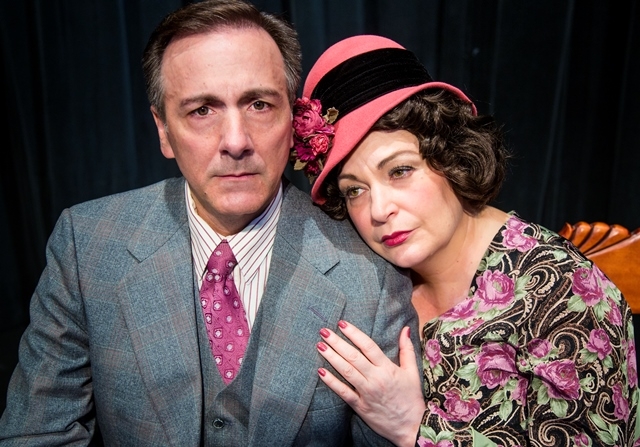“Gypsy” is beloved as the pinnacle of mid-20th century musicals, and despite the increasing distance from the era of vaudeville, remains relevant for its complex female characters and depiction of the tumultuous nature of the mother-daughter relationship, a theme that will never die, as well as its enduring numbers (music by Jule Styne with lyrics by Stephen Sondheim), such as “Everything’s Coming Up Roses” and “Let Me Entertain You,” that have become standards.
In so many ways, Farmers Alley Theatre’s 10th season opener is a tremendous celebration of the American musical with its grand production of “Gypsy,” masterfully directed by Kathy Mulay. With a profoundly talented cast of 28, exceptional design and music direction, it sings and swells and shines in inventive and glorious ways.
Based on the 1957 memoir of famous striptease artist Gypsy Rose Lee, the story of “Gypsy” focuses on Lee’s mother, the consummate stage mother — both fierce mama bear committed to her children and demonic narcissist, wounded from abandonment by her own show business mother — who uses her children to fulfill her unrealized dream of becoming a star in the 1930s Vaudeville circuit. She’s a glamorous scrapper who embodies the light and the dark of mother archetype as well as feminine strength and power.
Is it any wonder that theater critic Clive Barnes described Mama Rose as one of the very few truly complex characters in the canon of American musicals? Ethel Merman originated the role on Broadway in 1959, and other extraordinary actresses since have played her on stage and screen, including Angela Lansbury, Tyne Daly, Bernadette Peters, Rosalind Russell, Bette Midler, and Patti LuPone.
In the Farmers Alley production, Mary Jo Mecca is a force as Rose. She’s lovely and matronly with a huge presence and powerful voice that is never forced. Her energy is consistently smooth and strong, and she brings great warmth to the stage and the relationships and connections with the other actors, especially Michael Ehlers as her fiancé Herbie and Stephanie Maloney as daughter Louise.
Mecca brings a fire to the role, but its heat is cozy rather than dangerous. She never quite raises the temperature in the room and lacks the manipulative, scheming desperation that should build to a crescendo in the final scenes that show just how sick she really is and how dark and twisted her relationship with her daughter is. It’s all there in the script, but here the shocking catharsis at the end is more surprising than tragic or joyful, when it should be all of that.
However, this production is undoubtedly still a monumental feat, a three-hour sensual delight full of terrific performances. Stephanie Maloney’s Louise undergoes a convincing ugly duckling transformation from one of the awkward boys to a beautiful woman who relishes her command and power as a burlesque queen. Maloney shows elegant range in this singular role, from complex character actor with depth of emotion to glamorous leading lady with an exquisite voice. She has excellent chemistry with Carver Duncan (an amazing dancer who does great things with Melissa Sparks’ terrific choreography, including crisp chene turns) as Tulsa and Katelyn Langwith as Dainty June.
Director Kathy Mulay clearly has a gift for working with children as the cast of nearly a dozen kids are utterly convincing in their roles and bring great joy to the stage. Most notably, Carly Koch is a skillful baton-twirling, high-kicking, high-pitched squealing Baby June.
Above and beyond the individual performances, this “Gypsy” is a sumptuous visual and aural work of art. Music Director Cindy Hunter leads a stunning orchestra of eight and the tremendously gifted cast of singers, so that each number as well as the show itself builds beautifully.
Mulay creates stage pictures so achingly lovely, they’d be worth seeing without words, movement, or music accompanying them. Her own inventive costume design is both fun and elegant, with highlights including Louise’s gorgeous gowns and the kooky collection of strippers’ barely-there animated and lit-up frocks — though less frumpy and sharper duds for Rose might have helped develop more edge for that character. Lanford J. Potts’ lighting design is bold and wildly dramatic yet also rich with subtlety and brings to life Kristen Martino’s artful scenic design with great feeling. These designers masterfully move the audience through the story as much as the script and performers do.
Overall, Farmers Alley’s “Gypsy” is an astounding achievement, a terrific opportunity to take in an American classic in which nearly everything’s coming up roses.
Gypsy
Oct. 6-22
farmersalleytheatre.com





